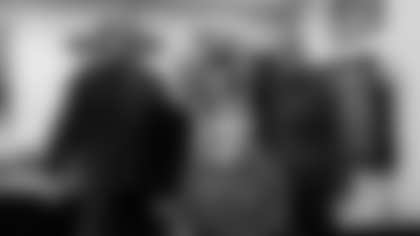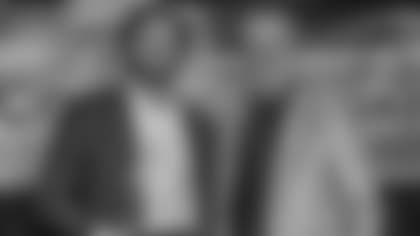Former Buffalo Bills wide receiver Marlin Briscoe, joined the John Murphy Show to discuss his days playing in the American Football League and the National Football League, as well as his life after retirement. Briscoe's football career took on life while at Nebraska Omaha, and his collegiate success led him to the AFL. He was drafted in 1968 by the AFL Denver Broncos in the 14th round with the 357th overall pick, and it was here that he would help pave the way for African American quarterbacks in professional football.
Briscoe excelled as a quarterback throughout college. Reminiscing on the day he was granted a role as the Bronco's starting signal caller, Briscoe explained that at the time he was aware of how monumental the opportunity was.
"Well you know, I knew it" said Briscoe. "I never got a lot of publicity, and not that I sought it, but looking back and reflecting on the things that I was able to accomplish and overcome is quite amazing."
Not only was Briscoe the first African American to start at quarterback in the AFL, he was initially overlooked at the position and was considered a better fit at defensive back.
"No it was definitely slated and penciled in that I would play defensive back at corner" Briscoe explained. "As a matter of fact until I got hurt, I was the starting cornerback. But what happened was, I got information from my former coach, Al Caniglia that Denver held practices out to the public. And so I decided when I negotiated my own contract… that I would play defensive back but I wanted to be granted a three day trial at quarterback. All I wanted to do was to exhibit my skills that I thought would be good enough to play quarterback" said Briscoe.
After showcasing his talent during the trial period, Briscoe made his quarterback debut on September 29, 1968 as the Denver Broncos took on the Boston Patriots at home. While Briscoe did not start in that game, he did earn the role for the team's next game versus the Cincinnati Bengals on October 6, 1968. In just a few weeks, during his rookie season, Briscoe managed to make his way into the history books.
Although Briscoe was only Denver's QB for one season, he recognizes that the achievement may not have been possible without Denver's Head Coach Lou Saban.
"Well, Lou first of all, kudos to him for giving me the opportunity—he didn't have to" said Briscoe. You know it didn't work out for me, even though I think I presented myself well."
Briscoe certainly did present himself well during the 1968 season. Having started in 11 games, Briscoe finished the campaign with 224 pass attempts and 93 completions for 1,589 yards, 14 touchdowns and 13 interceptions. Yet, uncertainty set in for Briscoe after he was released from Denver, as he contemplated whether or not he would be picked up by another team.
Taking matters into his own hands, Briscoe landed in Buffalo.
"I called around to teams who I had success against, and I had great games against Buffalo as a quarterback and Oakland" said Briscoe.
When he arrived in Buffalo Briscoe switched to the wide receiver position, where he would come to enjoy much success for the remainder of his career. Demonstrating his athleticism and passion for the game, Briscoe managed to learn the role, even though he did not have any experience as a wide out. In just his second season with the Bills, Briscoe defied expectations and became the team's leading receiver with 57 receptions for 1,036 yards and eight touchdowns. After three seasons, Briscoe finished his stint in Buffalo with 133 receptions for 2,171 yards and 18 touchdowns.
Briscoe earned awards while playing in the league, which included a trip to the Pro Bowl in 1970 after an elite year with the Bills. He also went on to appear in three consecutive Super Bowls with the Dolphins from 1972-1974. After Miami won Super Bowl VII and Super Bowl VIII, Briscoe found himself in San Diego. After one season with the Chargers, Briscoe moved on to Detroit and then New England before his retirement in 1976.
Once Briscoe's NFL career had come to an end, he relocated to Los Angeles and unfortunately suffered a lengthy 10-year battle with addiction. Proving his resiliency once again, Briscoe managed to turn his life around and make a positive impact on the Los Angeles County community through several years of work with the Boys and Girls Club.
Briscoe's story is one that is still very much celebrated today. Recently announced as a member of the 2016 College Football Hall of Fame class, as well as the subject of a movie currently in development, Briscoe's legacy is sure to live on.
Reflecting on his time in the league, Briscoe shared kind words about the Bills.
"Well War Memorial Stadium, it was different" Briscoe explained. "You know the weather or whatever. But, there is one thing I can say—the fans in Buffalo were the greatest. Whether on the field or off the field, some of the best relationships, short relationships, were in Buffalo and I love those people."






